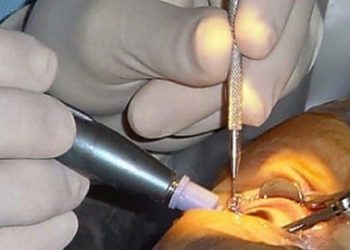Vitamin supplementation does not reduce the risk of cataract formation
1. In a randomized placebo-controlled trial of over 11,000 men, daily intake of selenium and vitamin E failed to have a beneficial effect on age-related cataracts.
2. There was no time point during the study period where vitamin E or selenium had a significant effect.
Evidence Rating Level: 1 (Excellent)
Study Rundown: Cataract is the most common cause of vision loss in the world. Both vitamin E and selenium have been found in the human lens and have been postulated to be involved in the prevention of cataract pathogenesis. The SELECT Eye Endpoints (SEE) study, an ancillary study of the SELECT trial, was completed to identify whether patients who took selenium and/or vitamin E supplementation had a decreased risk of developing cataract. Over 11,000 patients were part of this study and were randomized to placebo, vitamin E alone, selenium alone, or vitamin E and selenium. The primary end point was the development of cataracts as defined by evaluation findings on slit lamp examination. After a 5 year follow-up, there was no significant difference in the percentage of patients who developed cataract in the untreated group versus the treated group for both vitamin E and selenium supplementation. The strength of this study is the large cohort, which supports the conclusion that increased supplementation of vitamin E and selenium does not reduce the risk of cataract formation. Limitations of this study include the use of only male patients and the use of only one dosage, although these dosages were chosen based on safety data.
Click to read the study in JAMA Ophthalmology
Relevant Reading: Serum antioxidant vitamins and risk of cataract
In-Depth [randomized controlled trial]: The SELECT (Selenium and Vitamin E Cancer Prevention Trial) trial initially aimed to evaluate the role of Vitamin E and selenium supplementation in prostate cancer. Only approximately 11,000 of the original 35,000 men were eligible for the subsequent SEE study. Eligible patients were divided into 4 arms – placebo, vitamin E alone, selenium alone, and both vitamin E & selenium. Records from patients’ eye care providers were obtained to evaluate for presence of cataract. Primary endpoint was cataract formation with visual acuity of 20/30 or worse. All 4 arms were compared using Chi-squared testing. After 5.6 years, 389 cataracts were reported – of those, 189 patients were supplemented with selenium and 204 without selenium (HR 0.91; p=0.37). Furthermore, 197 patients with cataracts were supplemented with vitamin E and 192 without vitamin E (HR 1.02; p=0.81). Vitamin E and selenium therefore do not appear to be beneficial in cataract prevention.
More from this author: Argus II retinal prosthesis significantly improves spatial vision in blind patients, Artificial cornea is well retained in patients with ocular surface disease, High prevalence of undiagnosed glaucoma in West Africa, Interferon therapy is superior to methotrexate for uveitis, Rho kinase inhibitor safely reduces intraocular pressure
Image: PD
©2012-2014 2minutemedicine.com. All rights reserved. No works may be reproduced without expressed written consent from 2minutemedicine.com. Disclaimer: We present factual information directly from peer reviewed medical journals. No post should be construed as medical advice and is not intended as such by the authors, editors, staff or by 2minutemedicine.com. PLEASE SEE A HEALTHCARE PROVIDER IN YOUR AREA IF YOU SEEK MEDICAL ADVICE OF ANY SORT.







